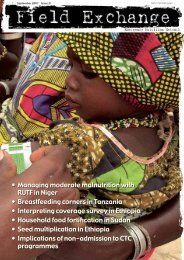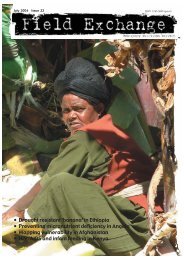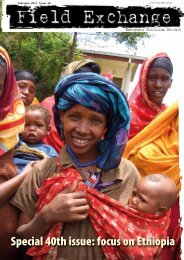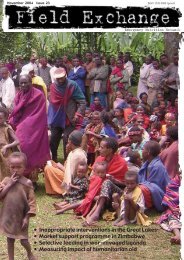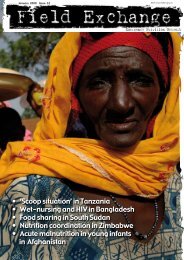Download a PDF of this issue - Field Exchange - Emergency ...
Download a PDF of this issue - Field Exchange - Emergency ...
Download a PDF of this issue - Field Exchange - Emergency ...
Create successful ePaper yourself
Turn your PDF publications into a flip-book with our unique Google optimized e-Paper software.
UNHCR Technical Workshop<br />
on the Operational Guidance<br />
on the use <strong>of</strong> Special<br />
Nutritional Products<br />
By Sarah Style and Andrew Seal<br />
Sarah Style is an ENN<br />
consultant working on<br />
the UNHCR/ENN<br />
Anaemia Control,<br />
Prevention and<br />
Reduction Project.<br />
Andy Seal is a lecturer and researcher<br />
at the UCL Centre for International<br />
Health and Development and a<br />
senior technical advisor to the ENN<br />
on the UNHCR/ENN Anaemia Control,<br />
Prevention and Reduction Project.<br />
News<br />
Table 1: Summary <strong>of</strong> Food Supplementation Products<br />
(FSP) and Fortified Blended Food (FBF) for use in<br />
children aged 6-59 months that are covered by the<br />
Operational Guidance<br />
FSP / FBF<br />
Micronutrient<br />
powder<br />
Low quantity<br />
LNS*<br />
Target<br />
age<br />
group<br />
Product descriptions<br />
6-59m MNPs provide no energy (kcal) in the<br />
diet. They are usually packaged in<br />
individual sachets to provide a dose<br />
<strong>of</strong> selected vitamins and minerals in<br />
powder form, to be added to foods<br />
directly after cooking. MNPs have<br />
been shown to be efficacious in<br />
treating and preventing anaemia.<br />
Branded products include Sprinkles<br />
and MixMe<br />
6-24m Highly fortified peanut-based paste<br />
that contains vitamins and minerals<br />
in addition to providing energy. It is<br />
usually packaged in individual daily<br />
sachets and is to be eaten either<br />
directly from the sachet or added to<br />
complementary food. It has been<br />
shown to improve linear growth in<br />
young children. Product brands<br />
include Nutributter® 2<br />
In July 2011, UNHCR, in collaboration with<br />
ENN, held a five-day technical training<br />
workshop to introduce the recently finalised<br />
‘Operational Guidance on the Use <strong>of</strong> Special<br />
Nutritional Products to Reduce Micronutrient<br />
Deficiencies and Malnutrition in Refugee<br />
Populations’.<br />
The Operational Guidance (described<br />
further in <strong>Field</strong> <strong>Exchange</strong> 41) deals with certain<br />
food supplementation products (FSP) (including<br />
micronutrient powders (MNP) and certain<br />
lipid-based nutrient supplements (LNS)) that<br />
are currently being used, or being considered<br />
for use, in blanket supplementary feeding<br />
programmes within UNHCR operations. These<br />
products are designed for use in programmes<br />
aiming to prevent malnutrition, with a particular<br />
focus on micronutrient deficiencies. The<br />
guidance has been developed to help country<br />
staff deal with the challenges and confusion in<br />
designing, implementing, monitoring and evaluating<br />
programmes using these new FSPs.<br />
The workshop was designed to provide both<br />
training on the use <strong>of</strong> the Operational Guidance<br />
and the opportunity for sharing <strong>of</strong> information<br />
and experiences <strong>of</strong> using these products in<br />
refugee camps across UNHCR operations. The<br />
overall aim was to enhance best practice and<br />
contribute to participants being better able to<br />
meet the needs <strong>of</strong> the refugee populations with<br />
whom they work.<br />
The specific objectives <strong>of</strong> <strong>this</strong> technical workshop<br />
were to:<br />
a) Provide standardised guidance on best<br />
practice in planning, implementing,<br />
monitoring and evaluating programmes<br />
using special nutritional products<br />
b) Improve the design, implementation and<br />
monitoring & evaluation <strong>of</strong> programmes<br />
using special nutritional products<br />
c) Build the capacity <strong>of</strong> technical health and<br />
nutrition staff from UNHCR and WFP in<br />
effectively managing programmes using<br />
these products in refugee situations.<br />
Twenty health and nutrition staff from<br />
UNHCR and WFP attended the workshop,<br />
which was held in Mombasa, Kenya.<br />
Participants represented operations in 12 countries:<br />
Algeria, Bangladesh, Chad, Djibouti,<br />
Ethiopia, Kenya, Nepal, Rwanda, Sudan,<br />
Tanzania, Uganda and Yemen.<br />
Workshop activities and agenda<br />
The workshop followed the general structure <strong>of</strong><br />
the Operational Guidance beginning with Stage<br />
1 on the first day (define the nutritional problem)<br />
through to Stage 6 (monitoring and<br />
evaluation) 1 . The workshop covered the key<br />
operational components relating to<br />
programmes using specific FSP intended for<br />
preventative purposes. See Table 1 for further<br />
product information.<br />
A variety <strong>of</strong> different learning methods were<br />
incorporated throughout the workshop, including<br />
presentations, case studies, individual<br />
exercises, group work, testing <strong>of</strong> various tools<br />
in the Operational Guidance, and optional<br />
evening sessions. Participants were invited to<br />
present their experiences, learning, and the<br />
challenges on the ground concerning<br />
programmes using FSPs. At the end <strong>of</strong> the<br />
workshop, participants were allocated time<br />
with facilitators to discuss any questions or<br />
challenges that they were facing relating to<br />
their country <strong>of</strong> operation and the way forward,<br />
and how to incorporate the principals and best<br />
practice outlined during the workshop.<br />
Follow up<br />
Workshop evaluation findings (daily feedback<br />
and final evaluation) were positive and constructive.<br />
The main challenge that<br />
participants identified for practice are<br />
budgetary constraints to purchase and<br />
manage products due in part to other<br />
competing operational needs. The<br />
main actions identified by participants<br />
to improve product related practice<br />
was to review their camp behaviour<br />
change and communication (BCC)<br />
strategy and to improve M&E systems<br />
including use <strong>of</strong> the M&E tools<br />
provided in the Operational Guidance.<br />
A clear expectation <strong>of</strong> the workshop<br />
was that all participants would<br />
conduct follow up training on their<br />
return to help build institutional<br />
knowledge.<br />
1<br />
See news piece in <strong>Field</strong> <strong>Exchange</strong> 41 for<br />
schematic.<br />
2<br />
This is the only product currently approved for<br />
use by UNHCR. Products are approved on a<br />
case by case basis. Similarly, only Plumpy’doz<br />
is approved as a medium quantity LNS.<br />
Credit: / UNHCR /F. Courbet, Ethiopia,<br />
2008<br />
Medium<br />
quantity LNS<br />
FBF+ / ++ 6-59m /<br />
6-24m<br />
6-36m Highly fortified peanut-based paste<br />
that contains vitamins and minerals<br />
in addition to providing energy. It is<br />
usually packaged in individual<br />
weekly pots. However it will also be<br />
available in the form <strong>of</strong> daily sachets,<br />
which is the preferred form for distribution.<br />
It has been used in<br />
programmes to prevent increases in<br />
GAM in young children during periods<br />
<strong>of</strong> food insecurity. Product<br />
brands include Plumpy’doz®<br />
FBF+ e.g. Corn-Soy Blend (CSB) is a<br />
food for young children and other<br />
vulnerable groups, as well as the<br />
general population. Its content <strong>of</strong><br />
vitamins and minerals has been<br />
modified compared to previous<br />
formulations. It is recommended as a<br />
partial replacement for nutritionally<br />
inadequate local diets.<br />
FBF++ is a newly developed FBF for<br />
infants over 6 months and young<br />
children. It contains milk powder and<br />
has a higher energy density than<br />
other types <strong>of</strong> FBF.<br />
Feedback from participants have been incorporated<br />
in the final version <strong>of</strong> the Operational<br />
Guidance which will shortly be available for<br />
public dissemination and download via<br />
http://info.refugee-nutrition.net<br />
For further information, contact Caroline<br />
Wilkinson at UNHCR, Geneva,<br />
email: wilkinso@unhcr.org<br />
Eritrean refugees in Shimelba<br />
refugee camp, Ethiopia<br />
48



